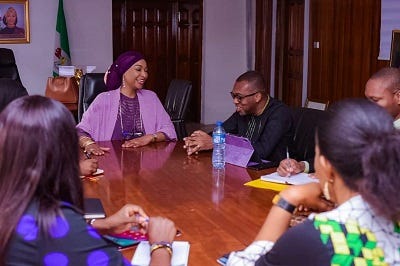A New Dawn for Nigeria-Jamaica Relations: Investing in Film and Animation
The creative industries have long been the silent economic engines driving cultural and economic growth across continents. In a remarkable turn of events, the Jamaican government has announced a significant investment initiative aimed at the Nigerian film and animation sectors, signaling a new chapter in Nigeria-Jamaica relations. This initiative was brought to light during a courtesy visit by the Jamaican High Commissioner to Nigeria, Mr. Lincoln Downer, to the Nigerian Minister of Art, Culture, and the Creative Economy, Ms. Hannatu Musa Musawa, in Abuja.
Historical and Cultural Ties
The diplomatic relations between Nigeria and Jamaica have spanned over 54 years, underscored by mutual respect and cultural exchanges. This relationship has been nurtured through various initiatives, including the technical eco-program, which has facilitated the exchange of artisans in Batik and jewelry-making. This foundation of collaboration has laid the groundwork for deeper engagements in the creative sectors, particularly in film and animation.
The Vision for Collaboration
Mr. Downer emphasized the profound potential for collaboration, recognizing Nigeria's pivotal role as a cultural hub both in Africa and globally. The Jamaican government's interest in expanding these ties reflects a strategic move to harness the strengths of both nations in storytelling, cultural representation, and creative expression. By investing in Nigeria’s burgeoning film and animation industries, Jamaica aims to create a synergistic relationship that will benefit both countries economically and culturally.
“We celebrated 54 years of establishing diplomatic relations between Nigeria and Jamaica. We are interested in future collaborations with Nigeria because we recognise Nigeria as the cultural hub of Africa and the globe. We also have a rich culture, so we are interested in forging a stronger alliance with Nigeria,” said Mr. Downer.
Economic and Cultural Impact
Nigeria’s film industry, popularly known as Nollywood, is the second largest in the world, only behind Bollywood in terms of volume. It produces thousands of films annually, contributing significantly to Nigeria's GDP. The potential infusion of Jamaican investment could enhance production quality, foster innovation, and create more job opportunities in both countries.
The animation sector, although still emerging in Nigeria, holds immense potential. With Jamaican investment and expertise, Nigeria’s animation industry could witness accelerated growth, tapping into global markets and expanding its reach. This collaboration could also facilitate the exchange of technical skills, creative ideas, and best practices, further enriching the cultural tapestry of both nations.
Strategic Initiatives and Programs
Ms. Hannatu Musa Musawa expressed keen interest in the proposed Audio-Visual Film Production Agreement and Jamaica’s Film Development initiative. These programs align closely with Nigeria's own IDICE (Innovation and Development in the Creative Economy) program, which aims to provide financial support and infrastructure to creatives.
“We are interested in the Audio-Visual Film Production Agreement proposed by Jamaica. I am excited about your Film Development initiative, which is similar to Nigeria’s IDICE and empowers creatives to flourish through financial support,” remarked Ms. Musawa.
Towards a Global Cultural Renaissance
The collaboration between Nigeria and Jamaica in film and animation is not merely an economic venture but a cultural renaissance. It reflects a shared vision to amplify African and Caribbean narratives, preserve cultural heritage, and promote diversity in global media. By fostering such alliances, both countries can leverage their rich cultural histories and dynamic creative talents to produce content that resonates globally.
Moreover, the potential declaration of an International Day for Afrobeat Music, as sought by Mrs. Zainab Ali-Biu, the Director of International Cultural Relations, further emphasizes the shared cultural heritage and the global influence of African and Caribbean art forms.





